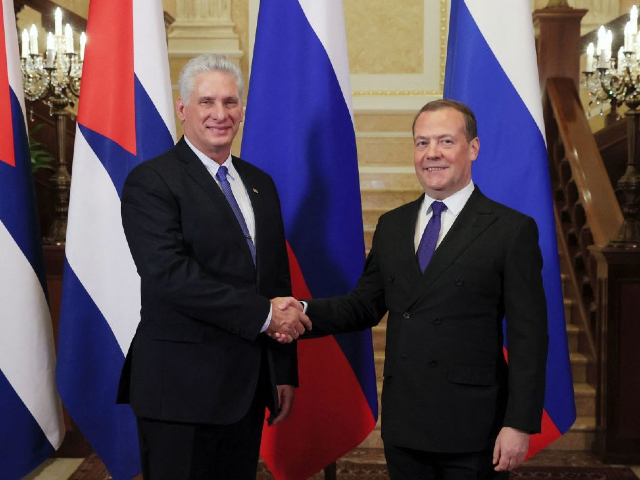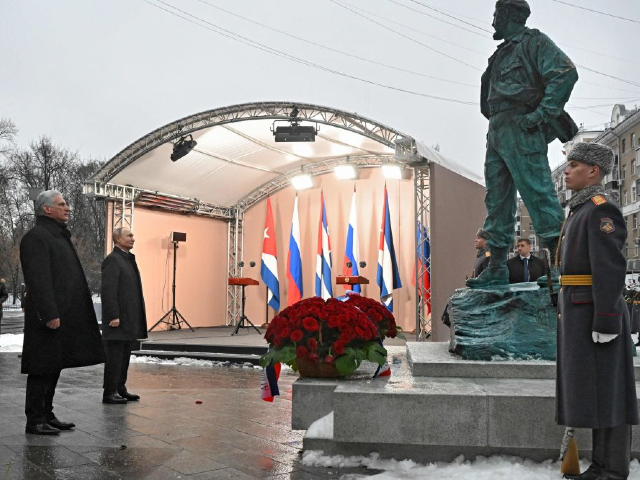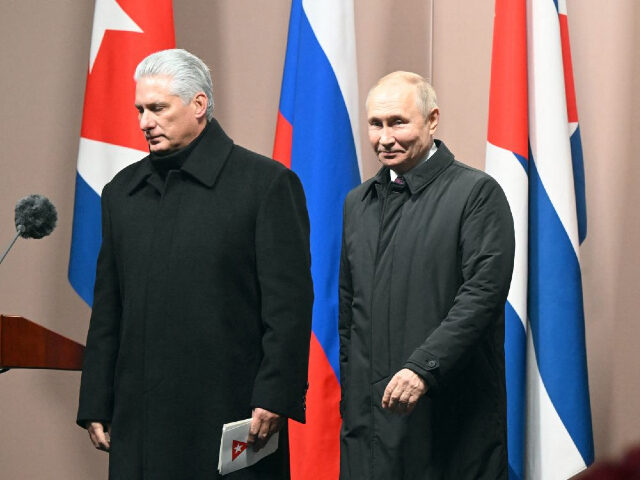Cuban puppet “president” Miguel Díaz-Canel is scheduled to meet with Russian leader Vladimir Putin on Tuesday after a tour that included an address to the legislature, an interview on state news outlet RT, and talks with United Russia party leader Dmitry Medvedev.
Díaz-Canel is on a four-nation tour that began with Algeria and Turkey and will culminate with a stop in Beijing, China, following his departure from Russia.
The “president” – a figurehead for the all-powerful Castro family in the communist dictatorship – has spent much of his journey to Russia discussing increasing economic ties and foreign investment and is expected to similarly invite Chinese businesses to help continue propping up the 63-year-old communist regime. The Cuban Communist Party’s stranglehold on power has diminished in the past year as a result on non-stop protests and its failure to provide basic services such as health care, electricity, and food to citizens. The regime has failed to silence the protests that erupted on July 11, 2021, and have continued since despite a nationwide campaign of police brutality and imprisonment of peaceful protesters, including children, for decades. Children as young as 11 years old have been victims of state security beatings for attempting to protect parents peacefully protesting for an end to communism.
In his interview with RT, the Russian propaganda outlet, Díaz-Canel emphasized the importance of Russian financial investment in the languishing Castro regime.
“As far as contributions to the Cuban economy, in the Cuban national development plan through 2030, the investments and participation of a group of companies and programs together with the Russian Federation are very present,” Díaz-Canel told RT.
The figurehead called for “deepening” economic ties with Russia to enhance a “mutually beneficial relationship,” though Cuba owes Russia billions of dollars and Russia has not received any significant economic benefit as a result of its Cuba policy. Cuba does serve Cuba as a vital geopolitical ally due to its proximity to the United States and to Venezuela, a Russian client state.

Deputy head of Russia’s Security Council Dmitry Medvedev (R) shakes hands with Cuban President Miguel Diaz-Canel during their meeting at the Gorki state residence outside Moscow, on November 21, 2022. (Photo by Yekaterina SHTUKINA / Sputnik / AFP) (Photo by YEKATERINA SHTUKINA/Sputnik/AFP via Getty Images)
Díaz-Canel met with Cuban diplomats at the country’s embassy in Russia on Sunday to pressure them to “more actively work to attract investors” to come to the island nation, the Spain-based Diario de Cuba journal reported.
Díaz-Canel reportedly spent much of his time addressing the Duma, the federal Russian legislature, condemning the American “embargo” of the country for the damage it allegedly does to the Cuban economy, despite its many loopholes and the fact that it does not prevent the world’s other 194 countries from doing business with the communist regime. He likened the embargo to sanctions imposed on Russia for its decision to invade and colonize neighboring Ukraine.
“Amid the difficult current crises and the difficult situation that Russia and Cuba are living through following the progressive imposition of unjust sanctions on the part of various imperialist power against our countries, there are a series of joint projects that have successfully developed despite them,” Díaz-Canel claimed. “Among them, I would like to mention the exploration of hydrocarbons in the Boca de Jaruco zone, where innovative methods are being used and the production of hydrocarbons is growing.”
“Cuba energetically condemns the sanctions imposed unilaterally and unfairly against Russia,” Díaz-Canel asserted. “One must look for the reasons for the current conflict in the region in the aggressive policies of the United States and the expansion of NATO towards the borders with Russia.”
The puppet president claimed that the “full development of economic and commercial ties” between Russia and Cuba had not yet been completed, urging more investment.
The Kremlin confirmed that Díaz-Canel would meet with Putin on Tuesday.
“The two heads of state are expected to exchange views on key issues on the international agenda,” the Russian news agency Tass reported, citing the Kremlin, “and discuss the current state of and prospects for the further development of the Russian-Cuban strategic partnership in the political, trade-and-economic, and humanitarian-and-cultural spheres.”
The Cuban figurehead also attended a ceremony to erect a statue honoring Cuban mass murderer Fidel Castro in Moscow.
The Chinese Foreign Ministry previewed Díaz-Canel’s visit to the world’s largest and most repressive communist nation on Monday, hinting at a similar emphasis on investment.
“President Díaz-Canel will be the first head of state from a country in Latin America and the Caribbean that China receives after it held the 20th National Congress of the Communist Party of China,” Foreign Ministry spokeswoman Mao Ning told reporters. “We are confident that President Díaz-Canel’s visit will inject new impetus into the development of China-Cuba relations and boost new progress in our traditional friendship and friendly cooperation.”
“Since the establishment of diplomatic ties 62 years ago, despite international vicissitudes, China and Cuba have forged ahead together on the path of building socialism with national characteristics,” Mao explained, “supported each other on issues concerning core interests and had close coordination on international and regional issues, setting an exemplary model for solidarity and cooperation between socialist countries and sincere mutual assistance between developing countries.”
Díaz-Canel is expected to arrive in China on Thursday local time. In observance of his arrival, the Chinese state-run publication Global Times published a story on Monday citing Chinese regime “experts” concluding that the Communist Party of Cuba, in power for 63 years, shared no blame in the devastating economic situation of the country.

Cuban President Miguel Diaz-Canel Bermudez (L) and Russian President Vladimir Putin inaugurate a monument to late Cuban leader Fidel Castro in Moscow on November 22, 2022. (Photo by Sergei GUNEYEV / SPUTNIK / AFP) (Photo by SERGEI GUNEYEV/SPUTNIK/AFP via Getty Images)
“It is crystal clear that Cuba’s difficulty in economy and people’s livelihood are largely caused by US sanctions,” the Global Times proclaimed, citing “experts.” “Washington, amid the [Chinese coronavirus] pandemic, even added up more measures and attempted to stage political chaos in Cuba, yet Cuba stands robustly, experts said.”
In reality, the United States has offered Cuba humanitarian aid following the landing of Hurricane Ian last month, which knocked out Cuba’s power grid and has resulted in near-total blackouts in some areas. The Cuban government made clear its lack of interest in medical aid during the pandemic by “offering” America its questionable home-brewed coronavirus vaccine products.
On the economic front, the Castro regime courted more Chinese business investment with an announcement last week in which it would expand access to the Cuban market for the Chinese online shop JD.com.
“Exports to China will very much contribute to Cuba’s economic growth as well as to attract hard currencies for the country,” Deputy Minister of Foreign Trade and Investment Deborah Rivasshe announced, according to the Chinese state outlet Xinhua.

COMMENTS
Please let us know if you're having issues with commenting.